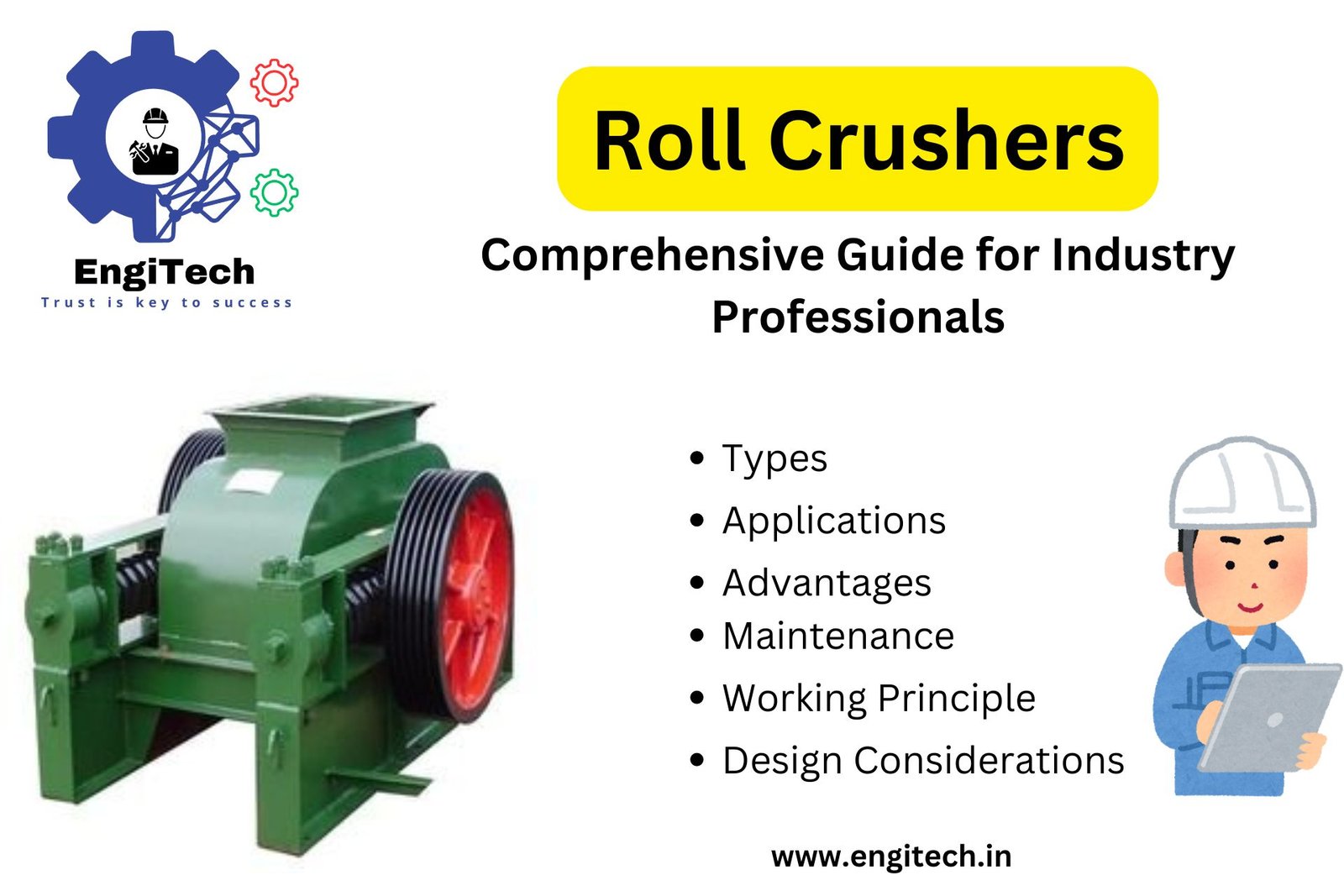Roll Crushers: A Comprehensive Guide for Knowledge Seekers and Professionals

Roll crushers are essential machines in various industries, particularly in mining and material processing. They efficiently reduce large rocks or ores into smaller, more manageable sizes.
This comprehensive guide explores the intricacies of roll crushers, including their types, working principles, applications, and benefits. Whether you’re a student, knowledge seeker, or working professional, this article aims to provide detailed insights and address common queries about roll crushers.
Table of Contents
Understanding Roll Crushers
Roll crushers are mechanical devices designed to crush materials using compression. They consist of two or more heavy cylinders (or rolls) that rotate towards each other. The material to be crushed is fed into the gap between the rolls, where it is compressed and fractured.
Key Features of Roll Crushers
- High Efficiency: Roll crushers are known for their high efficiency in reducing material size with minimal fines production.
- Adjustable Settings: The gap between the rolls can be adjusted to control the output size, making roll crushers versatile for various applications.
- Low Operational Costs: With minimal maintenance requirements, roll crushers are cost-effective for long-term operations.
Types of Roll Crushers
Roll crushers come in several types, each suited for specific applications. Understanding the differences between them is crucial for selecting the right crusher for your needs.
1. Double Roll Crusher
The double roll crusher is one of the most common types of roll crushers. It features two cylindrical rolls that rotate in opposite directions. This configuration allows the crusher to handle larger feed sizes and produce a uniform output.
Applications:
- Coal crushing
- Limestone crushing
- Medium-hard rock crushing
Advantages:
- Uniform product size
- Low dust production
- Energy-efficient
2. Toothed Roll Crusher
Toothed roll crushers have toothed or serrated rolls that provide better grip and crushing efficiency for brittle materials. The teeth on the rolls help to tear and break down materials into smaller pieces.
Applications:
- Coal
- Salt
- Clay
Advantages:
- Efficient crushing of friable materials
- Minimal fines production
- Adjustable tooth design for various materials
3. Roller Crusher Machine
A roller crusher machine is similar to a double roll crusher but features additional rollers, increasing the crushing capacity. These machines are ideal for large-scale operations requiring continuous material processing.
Applications:
- Aggregate production
- Mining operations
- Cement industry
Advantages:
- High throughput
- Consistent product size
- Low wear and tear
Working Principle of Roll Crushers
The working principle of roll crushers is straightforward. When the material is fed into the crusher, the rolls rotate towards each other, exerting compressive force on the material. The material is then crushed between the rolls and discharged from the bottom of the machine.
Step-by-Step Process:
- Feeding Material: The material is fed into the crusher’s top.
- Crushing Action: The rolls rotate, pulling the material into the gap and applying pressure to crush it.
- Discharge: The crushed material exits through the bottom of the machine.
Factors Influencing Roll Crusher Performance
Several factors can affect the performance of roll crushers. Understanding these factors can help optimize the crushing process and achieve the desired output.
1. Roll Speed
The speed at which the rolls rotate significantly impacts the crusher’s efficiency. Higher speeds result in finer output, while lower speeds produce coarser material.
2. Roll Diameter
The diameter of the rolls determines the crusher’s capacity. Larger rolls can handle more significant material sizes and produce higher throughput.
3. Material Characteristics
The hardness, moisture content, and abrasiveness of the material affect the crushing process. Softer materials are easier to crush, while harder materials require more force.
4. Gap Setting
The gap between the rolls can be adjusted to control the size of the crushed material. Narrower gaps produce finer output, while wider gaps result in coarser material.
Applications of Roll Crushers
Roll crushers are versatile machines used in various industries for different applications. Here are some common uses:
1. Mining Industry
In mining, roll crushers are used to crush ores and rocks, making them easier to transport and process. They are particularly effective in coal and mineral mining.
2. Aggregate Production
Roll crushers are used to produce aggregates for construction projects. They efficiently reduce the size of stones and rocks for use in road construction, concrete production, and other applications.
3. Cement Industry
In the cement industry, roll crushers are used to crush raw materials like limestone and clay. This process is essential for preparing materials for the production of cement.
4. Recycling Industry
Roll crushers are also used in recycling operations to crush materials like glass, ceramics, and metal scraps. This helps reduce waste and promotes sustainable practices.
Advantages of Roll Crushers
Roll crushers offer several benefits that make them ideal for various applications. Here are some key advantages:
1. Efficient Size Reduction
Roll crushers provide efficient size reduction, making them suitable for processing large volumes of material quickly and effectively.
2. Low Dust and Noise Levels
Compared to other crushers, roll crushers produce less dust and noise, making them environmentally friendly and suitable for use in populated areas.
3. Versatility
With adjustable settings, roll crushers can be customized to handle different materials and produce various output sizes, making them versatile for multiple industries.
4. Cost-Effective
Roll crushers have low operational costs, require minimal maintenance, and have a long service life, making them a cost-effective choice for businesses.
Expert Insights on Roll Crushers
Our team of expert engineers has extensive experience working with roll crushers in various industries. Here are some insights they offer:
- Material Consideration: “When selecting a roll crusher, always consider the material’s hardness and abrasiveness. For harder materials, ensure the rolls are made from durable materials like manganese steel.”
- Maintenance Tips: “Regularly inspect the rolls for wear and tear. Replacing worn rolls promptly can prevent costly downtime and maintain crushing efficiency.”
- Operational Efficiency: “Optimizing roll speed and gap settings based on material characteristics can significantly improve the crusher’s efficiency and output quality.”
Frequently Asked Questions (FAQs) about Roll Crushers
- What are the main components of a roll crusher?
- Roll crushers consist of rolls, a frame, a feed hopper, and an adjustable discharge opening. The rolls are the most critical component, responsible for the actual crushing process.
- How do I maintain my roll crusher to ensure longevity?
- Regular inspection and maintenance are essential. This includes checking for wear on the rolls, ensuring proper lubrication of moving parts, and making necessary adjustments to the gap setting.
- Can roll crushers handle wet or sticky materials?
- Roll crushers are generally not recommended for wet or sticky materials, as these can clog the machine. For such materials, other types of crushers like impact crushers or hammer mills might be more suitable.
- What is the difference between a smooth roll crusher and a toothed roll crusher?
- A smooth roll crusher has plain, smooth rolls that are used for fine crushing of softer materials. A toothed roll crusher has grooves or teeth on the roll surfaces, making it ideal for crushing brittle materials like coal and salt.
- How does the roll speed affect the crusher’s performance?
- The roll speed impacts the crushing efficiency and the size of the output. Higher speeds result in finer output, while lower speeds produce coarser material.
- What materials can be processed with roll crushers?
- Roll crushers are versatile and can process a variety of materials, including coal, limestone, clay, gypsum, salt, and shale. The choice of crusher depends on the hardness and size of the material.
- Are roll crushers energy-efficient?
- Yes, roll crushers are known for their energy efficiency. They consume less power compared to other types of crushers and produce minimal fines, making them cost-effective.
- How do I adjust the gap between the rolls?
- The gap between the rolls can usually be adjusted manually or through an automated system, depending on the model. Adjusting the gap controls the size of the output material.
- What safety precautions should I take when operating a roll crusher?
- Always follow the manufacturer’s guidelines. Use protective gear, ensure that the machine is properly grounded, and never attempt to clear jams while the machine is in operation.
- Can roll crushers be used for primary and secondary crushing?
- Yes, roll crushers can be used for both primary and secondary crushing. However, their primary use is in secondary and tertiary crushing stages.
- What is the expected lifespan of a roll crusher?
- The lifespan of a roll crusher depends on the material it processes and how well it is maintained. With proper care, the rolls can last several years before needing replacement.
- How do roll crushers compare to other types of crushers?
- Roll crushers are typically used for softer materials and are less efficient with hard, abrasive materials compared to jaw or cone crushers. They are also quieter and produce less dust.
- Is a roll crusher suitable for reducing the size of waste materials?
- Yes, roll crushers can be used in recycling operations to reduce the size of materials like glass, ceramics, and metal scraps.
- What factors influence the selection of a roll crusher?
- Key factors include the material’s hardness, moisture content, the required output size, and the desired production capacity.
- Can roll crushers be used in mobile crushing plants?
- Yes, roll crushers can be integrated into mobile crushing plants, making them suitable for on-site processing of materials.
Conclusion:
Roll crushers play a crucial role in modern industry, providing efficient and cost-effective solutions for size reduction. Their versatility, low operational costs, and environmental benefits make them indispensable in various applications, from mining to recycling.
Whether you’re a student, knowledge seeker, or working professional, understanding the nuances of roll crushers can enhance your knowledge and help you make informed decisions in your field. By following best practices and leveraging expert insights, you can optimize the performance of roll crushers and achieve the desired results in your operations.
From EngiTech Team
EngiTech is Your ultimate destination for cutting-edge insights and expertise in industrial machinery. At EngiTech, we bridge the gap between innovation and application, providing comprehensive resources, expert analysis, and the latest trends in engineering. Whether you’re a seasoned professional or a curious learner, our expertly crafted content empowers you to make informed decisions and stay ahead in the dynamic world of engineering. Explore EngiTech’s Articles today and elevate your knowledge to new heights!


